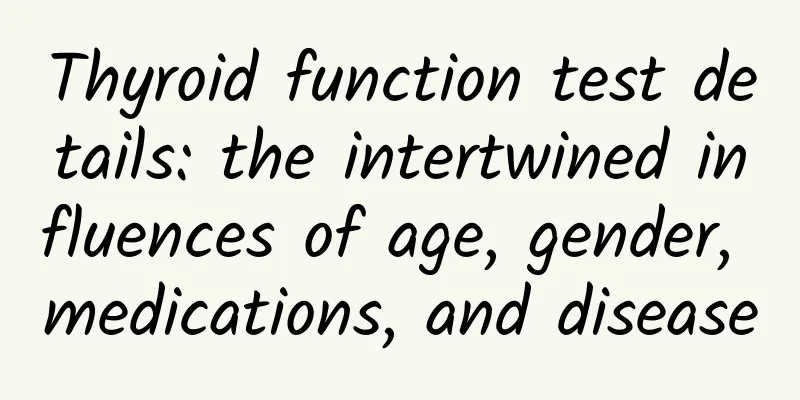Thyroid function test details: the intertwined influences of age, gender, medications, and disease

|
Author: Liu Xiangyi, Professor of Beijing Tongren Hospital, Capital Medical University Reviewer: Wu Xueyan, Chief Physician, Peking Union Medical College Hospital Thyroid function tests play a pivotal role in health checkups and disease screening. They are not only the key basis for diagnosing thyroid diseases, but also an important tool for adjusting treatment plans and monitoring disease changes. However, many patients are confused by complex test data and changing clinical manifestations. First, let's discuss a frequently mentioned question: Does a slight increase in thyroid stimulating hormone (TSH) in the elderly mean hypothyroidism? This is a controversial topic because the thyroid function of the elderly does change with age. As an important indicator of thyroid function, the changes in TSH are often closely related to the levels of T3 (triiodothyronine) and T4 (thyroxine). Under normal circumstances, when the levels of T3 and T4 decrease, the body will increase TSH in order to maintain the stability of thyroid function, which is a negative feedback regulation mechanism. However, for the elderly, due to their slowed metabolic rate, the thyroid function itself may be somewhat reduced, so a slight increase in TSH may be a normal phenomenon. In fact, only when the TSH level exceeds a certain node value (such as 10mIU/L) do we consider the possibility of hypothyroidism and the need for medical intervention. For the control of TSH levels in the elderly, more attention should be paid to individualization to avoid excessive treatment leading to adverse consequences such as hyperthyroidism. Next, we focus on the special group of women. Women's thyroid hormone levels change significantly during different stages such as puberty, pregnancy and menopause. This is mainly because changes in women's sex hormone levels will negatively feedback and affect the regulation of the pituitary and hypothalamus. Therefore, for women, thyroid function tests should be more detailed and personalized. For example, during pregnancy, the TSH level of pregnant women needs to be controlled within a certain range to avoid the impact of hypothyroidism on the intellectual development of the fetus. At present, there is some controversy about the control value of TSH levels in pregnant women, but it is generally believed that it should be controlled below 4.0mIU/L. The formulation of this standard is based on large-scale data analysis and aims to ensure the healthy development of the fetus. At the same time, for women of different age groups, the reference range of their TSH levels should also be different to better reflect their thyroid function status. Figure 1 Original copyright image, no permission to reprint When discussing the effects of drugs on thyroid function tests, we have to mention the drug amiodarone. Amiodarone is a drug commonly used to treat arrhythmias, but it may interfere with thyroid function tests. Specifically, amiodarone may affect the measurement results of indicators such as TSH, T3, and T4, resulting in false positives or false negatives. This interference effect varies between individuals. Some people may be affected at normal doses, while others may need to take more than twice the therapeutic dose before interference occurs. Therefore, when conducting thyroid function tests, full consideration should be given to whether the patient is taking drugs such as amiodarone, and appropriate measures should be taken to determine interference. In addition, subacute thyroiditis is also one of the important factors affecting thyroid function. Subacute thyroiditis is an inflammation of the thyroid gland caused by a viral infection, which may lead to impaired synthesis of thyroglobulin, thereby affecting the synthesis and release of thyroid hormones. In this case, the patient's thyroid function may be abnormal. However, it is worth noting that subacute thyroiditis is usually self-limiting, that is, it can recover on its own after a period of time. Therefore, after the diagnosis of subacute thyroiditis, patients do not need to worry too much, just need to closely monitor changes in thyroid function. At the same time, laboratory tests can distinguish subacute thyroiditis from other thyroid diseases (such as Graves' disease). For example, Graves' disease is an autoimmune disease, and its antibody levels are usually continuously positive, but this is not the case with subacute thyroiditis. Figure 2 Original copyright image, no permission to reprint Finally, we have to mention a confusing phenomenon: there are differences in the reference intervals of thyroid function between different hospitals. The reason for this phenomenon is that thyroid function tests have not yet been standardized. Different detection systems, different measurement methods, and different population characteristics may lead to differences in reference intervals. Therefore, when undergoing thyroid function tests, patients should choose a hospital for continuous monitoring to avoid misdiagnosis or missed diagnosis due to inconsistent reference intervals. At the same time, in order to obtain more accurate test results, patients should be tested in the morning, because hormone levels in the morning are relatively stable and better reflect the body's true state. |
>>: Thyroid diseases are prevalent, you must understand these test indicators!
Recommend
What should I do if the connection between the nipple and areola is cracked?
During breastfeeding, mothers will encounter vari...
Mouth soreness in late pregnancy
There are many factors that cause sour mouth in t...
Causes of Polycystic Ovarian Disease
Polycystic ovary syndrome is a common complex dis...
Treatment of multiple cervical cysts
I believe that everyone is not too familiar with ...
What is the correct sleeping position for pregnant women with low placenta?
What is the correct sleeping position for pregnan...
What to do if vulvar acne is painful
I always feel that my vulva is uncomfortable and ...
Girls urinate blood
Generally speaking, you can inquire about a perso...
Slightly curly medium length hair
Medium-length hair is the most common hairstyle a...
How long does it take for the water bag to react after induction of labor?
If the menstrual cycle is normal, the pregnancy p...
How do girls maintain their uterus?
Nowadays, work pressure is getting higher and hig...
How can I make camellia bloom before the Spring Festival? Can camellia be grown outdoors in the north in winter?
Camellia is a common woody plant in the south tha...
When is the best time to get laser treatment for stretch marks?
If women want to solve the problem of stretch mar...
How much do you know about hysterosalpingography? What should you pay attention to before and after the examination?
Author: Miao Jie, deputy chief physician, Beijing...
Frequently asked questions and answers about HPV vaccination, please bookmark and forward!
According to statistics from the World Health Org...
Pregnant women can't sleep little remedy
During pregnancy, it is common to have poor sleep...









